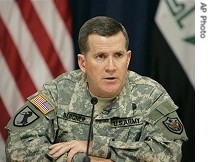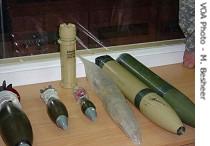-
(单词翻译:双击或拖选)
Baghdad
02 July 2007
The American military says it has evidence Iran is using the Lebanese Shiite militia1 group Hezbollah as a proxy2 to arm Shiite militants4 in Iraq. Officials also say Iran's elite5 Quds Force was aware of and helped plan a militant3 attack on U.S. forces in Iraq that killed five American soldiers. From Baghdad, VOA's Margaret Besheer has more.
 |
| General Kevin Bergner |
In 2005, senior Hezbollah leadership sent him to Iran to work with the elite Quds Force to train Iraqi extremists both in Iran and Iraq.
"Quds Force along with Hezbollah instructors6 train approximately 20 to 60 Iraqis at a time, sending them back to Iraq organized into these special groups," he said. "They are being taught how to use EFPs [explosively formed projectiles], mortars7, rockets, as well as intelligence, sniper and kidnapping operations."
In addition to training, General Bergner says Quds Force supplied these special groups with weapons and funding of 750,000 to $3 million a month.
The Quds Force is a special unit of Iran's Revolutionary Guards, which reports directly to Supreme8 Leader of Iran Ayatollah Ali Khamenei.
 |
| Iranian-made weapons |
"That would be hard to imagine," he said.
The American military has accused the Quds Force of arming and financing Iraqi extremists to carry out attacks against U.S. and Iraqi forces -- a charge Tehran denies.
Associated Press quotes Hezbollah spokesmen in Lebanon as saying they were checking into the claims Dakdouk was a member of the group and would not comment. In the past, the group has denied any activities in Iraq. In late 2005, British Prime Minister Tony Blair said his government suspected Iran and Lebanon's Hezbollah might be supplying technology and explosives to Shiite Muslim militant groups operating in Iraq, but he provided no proof.
Also captured with Daqduq were two members of these special groups network: Iraqi brothers Qayis and Laith Khazali.
Bergner told reporters the captured militants are accused of ordering the attack on a U.S. compound in Karbala in January and admitted that senior leaders from the Iranian Revolutionary Guards' unit supported the strike.
"Both Ali Musa Daqduq and Qayis Khazali state that senior leadership within the Quds Force knew of and supported planning for the eventual9 Karbala attack that killed five coalition10 soldiers,"he said.
Iraq's two main Shi'ite militias11 - the Mehdi Army of Moqtada al-Sadr and the Badr Brigade of Abdul Aziz al-Hakim - which both have strong ties to Iran - were not implicated12 in these special groups.
The general says Hezbollah does not appear to have an extensive network inside Iraq, but that they provide the Quds Force with a proxy to do the work may not want to do themselves, as well as a technical skill, a level of sophistication and street credibility to their interaction with these special groups and secret cells.
 收听单词发音
收听单词发音
1
militia

|
|
| n.民兵,民兵组织 | |
参考例句: |
|
|
|
2
proxy

|
|
| n.代理权,代表权;(对代理人的)委托书;代理人 | |
参考例句: |
|
|
|
3
militant

|
|
| adj.激进的,好斗的;n.激进分子,斗士 | |
参考例句: |
|
|
|
4
militants

|
|
| 激进分子,好斗分子( militant的名词复数 ) | |
参考例句: |
|
|
|
5
elite

|
|
| n.精英阶层;实力集团;adj.杰出的,卓越的 | |
参考例句: |
|
|
|
6
instructors

|
|
| 指导者,教师( instructor的名词复数 ) | |
参考例句: |
|
|
|
7
mortars

|
|
| n.迫击炮( mortar的名词复数 );砂浆;房产;研钵 | |
参考例句: |
|
|
|
8
supreme

|
|
| adj.极度的,最重要的;至高的,最高的 | |
参考例句: |
|
|
|
9
eventual

|
|
| adj.最后的,结局的,最终的 | |
参考例句: |
|
|
|
10
coalition

|
|
| n.结合体,同盟,结合,联合 | |
参考例句: |
|
|
|
11
militias

|
|
| n.民兵组织,民兵( militia的名词复数 ) | |
参考例句: |
|
|
|
12
implicated

|
|
| adj.密切关联的;牵涉其中的 | |
参考例句: |
|
|
|















